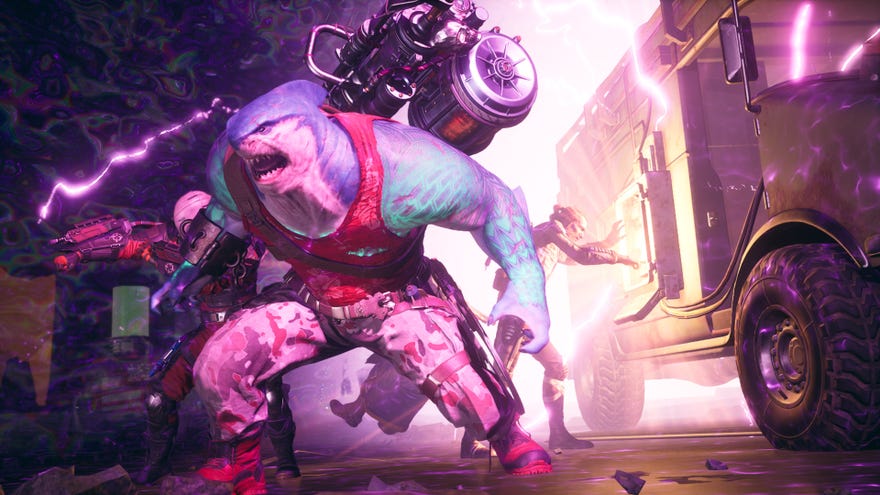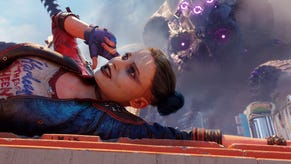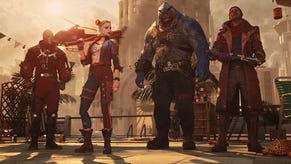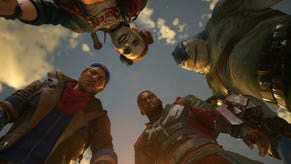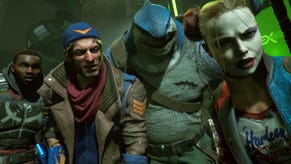Suicide Squad: Kill The Justice League review: a looter shooter in need of rescuing
Tired and tested
Suicide Squad: Kill The Justice League feels like a perfectly average open world action game that plops out when a finance department locks a brilliant developer in a room and refuses to let them see sunlight for nine years. Rocksteady’s long-awaited live service shooter is aggressively unambitious and seemingly petrified of risk, marrying tight, combo-ratcheting, flow-state combat with some awfully familiar and conventional loot-chasing guff.
For reasons no more complicated than the fact you can’t give Superman a machine gun, you get to play as the villains in this one. Harley Quinn stars alongside three additional baddies plucked from the dustiest recesses of the DC universe wiki, each armed with their own signature style of fighting and movement. Quinn swings on Spider-Man-esque ropes, Deadshot has an Iron Man-esque jetpack, Captain Boomerang can teleport, and King Shark sort of hulks around the place.
It’s all very legally distinct stuff, and takes place in a version of Metropolis besieged by Brainiac, the DC mega-villain who’s conveniently turned the Justice League so incredibly evil that murdering them one by one in a series of self-contained combat arenas over the course of a few dozen hours is the only justifiable response. Brainiac lives inside an enormous hovering skull, by the way, looming over the city like a colossal metal pervert, a pair of glowing, Barbie-pink eyes watching your every move.
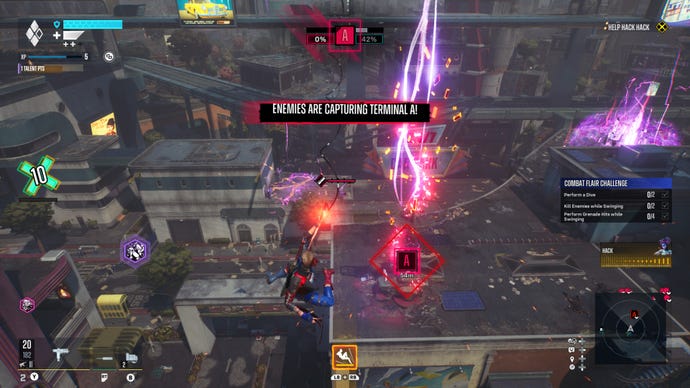
Your moves are mostly to do with blasting generic zombie grunts with marginally better guns, so that larger and larger numbers ping out of them. Suicide Squad: Kill the Justice League is a third-person shooter at its heart, mixed with silky Sunset Overdrive-style parkour, in which you thread together your jumps, swings, slides, kills and bounces to reset your movement cooldowns, increase your combo score, and dole out more damage.
Combat is designed to keep you constantly moving. Some enemies will helpfully telegraph their upcoming attacks, giving you a brief window to counter them with a special shot. Your shield is replenished by meleeing sufficiently weakened enemies, prompting you to repeatedly switch between long-range and short-range attacks. In this way you’re forever diving into throngs of enemies, smacking them up for a bit, then zipping away again to keep your combo-level ticking over. It’s conventional stuff, but lots of fun.
The gradually increasing combo gauge really seems like it should have been the central pillar of the game’s combat, as it often feels sidelined in all of the carnival mayhem, though. You’ll routinely blast your way to a 50x combo without actively trying to, only realising you’ve hit the combo cap when your eyes find a spare millisecond to glance at the indicator on the edge of the screen.
Layered atop the basic combat is an increasingly chaotic set of special moves, critical hits, grenades, afflictions and traversal attacks – so much that the fighting starts to feel bogged down by the needless complexity of it all. At its very best, fights in Suicide Squad feels exquisitely choreographed, thrumming and bouncy. The vast amount of information on screen – the whizzing digits, the neon explosions and the glittering, fruit machine light shows – pushes down hard on whichever bit of the human brain is responsible for dispensing sweet, sweet dopamine.
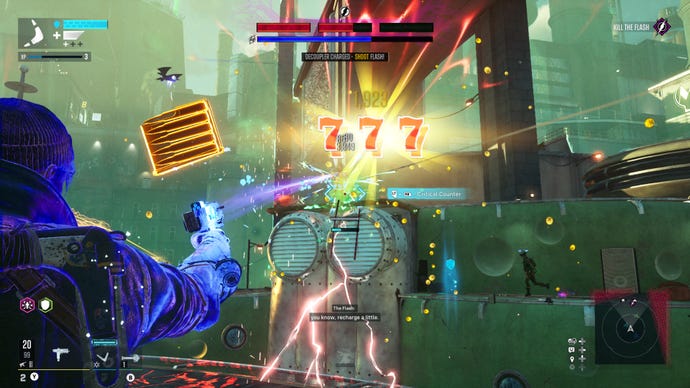
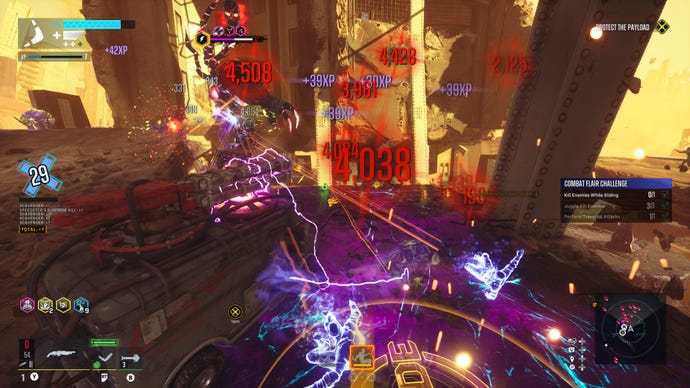
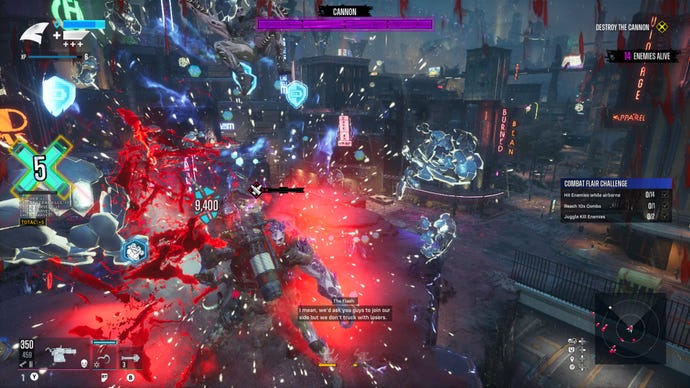
But less would have been so much more here. Suicide Squad’s overly fussy combat exists to serve the game’s loot machine: so that you can discover and equip new guns and equipment with buffs that do things like increase the amount of shield energy you harvest, lower your traversal cooldown times, apply afflictions or give you an infinitesimally better chance of landing a critical hit. The game seems to be aware of this too, and offers contracts and missions that reward you for murdering baddies using moves you might have forgotten existed.
Your rewards for all of this scrapping are an endless glut of colourful resources, which come in way too many flavours to count. There are experience points, naturally enough, and then money, and then some sort of alloy I think. Then the likes of special Penguin juice needed for an entirely superfluous crafting system, which lets you recycle old weapons and reroll buffs and so on, and so on, until your eyes glaze over, you slump forward in your seat and quietly choke to death on your own tongue.
Suicide Squad piles conventional live service feature on top of conventional live service feature, until this poor overburdened donkey’s spine begins to buckle and break under the weight of it all. The grind becomes an overwhelming ordeal, and it becomes increasingly difficult to tease much basic enjoyment out of the repetitive mission types and the achingly incremental loot upgrades.
Still, the story and its characters are entertaining enough to pull you through the morass of dull resource harvesting and loot unboxing. After a faltering start, the gratingly sarcastic protagonists each become genuinely likeable characters, with seemingly billions of lines of spoken dialogue between them. But just as the nattering brings the characters out of a slump, their non-stop quipping means reactive conversations between the squad regularly overlap with Batman’s delightfully arch radio narration, which overlaps with important mission dialogue, which overlaps with overheard grunt chatter, all creating the uncomfortable sensation that you’ve become trapped in a fast-moving, fully voice-acted Twitch chat.
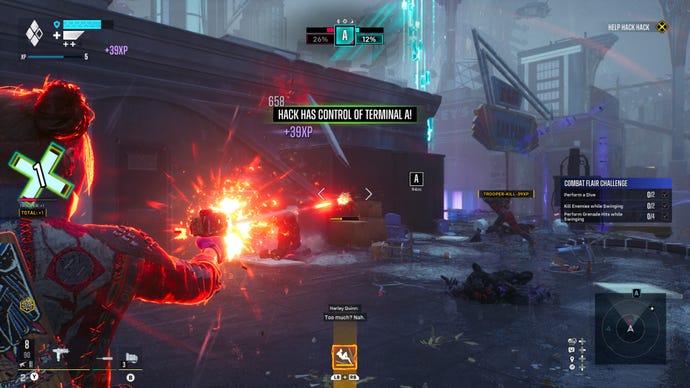
The writing suffers from that singularly sarcastic tone found in all comic book movies – and it’s frequently apparent that actors weren’t recording their lines in the same room, or even at the same time – but for the most part Suicide Squad has a well-written and performed script. It’s especially gratifying to hear squad mates dole out highly specific compliments when you manage to pull off a particularly good bit of fighting.
There’s a really excellent single-player action game hiding somewhere deep inside Suicide Squad: Kill the Justice League, calling out for help from beneath a few metric tonnes of loot-addled drudgery. The vast talent of Rocksteady peeps out just often enough to make it worthwhile for the genre’s fans, but the game’s extended development time has Suicide Squad chasing old trends, leaving it feeling cautious, unambitious and old-fashioned.
This review is based on a retail build of the game provided by publishers Warner Bros.
